Vladimir Kara-Murza won’t quit.
The Russian politician and dissident has been poisoned on two occasions—once in 2015 and again in 2017. In April 2022, he was convicted of “high treason” for speeches he had delivered, two of which criticized Russia’s war in Ukraine. The indictment claimed he had deliberately spread false information about the Russian military and therefore had done “substantial harm to the interests of the Russian Federation.”
He was sentenced to 25 years. At the courthouse after his sentence, one guard said to him, “You just got 25 years for five public speeches. I hope they were good.”
His punishment even surprised his fellow prisoners. In a scene that could be right out of Aleksandr Solzhenitsyn’s Gulag Archipelago, Kara-Murza recalls being in a transport car on his way to his prison in Siberia. The prisoners were sharing their indictments and term lengths, and after hearing about Kara Murza’s one of them remarked, “What did you do, man? Did you eat people?”
Kara-Murza received the Dissident Human Rights Award from the Victims of Communism Memorial Foundation last year, in absentia. But after a complex prisoner swap negotiated by the United States, Germany, and other nations back in August, he was freed from his confinement in Vladimir Putin’s Russia.
This past November, he was able to receive his recognition in person.
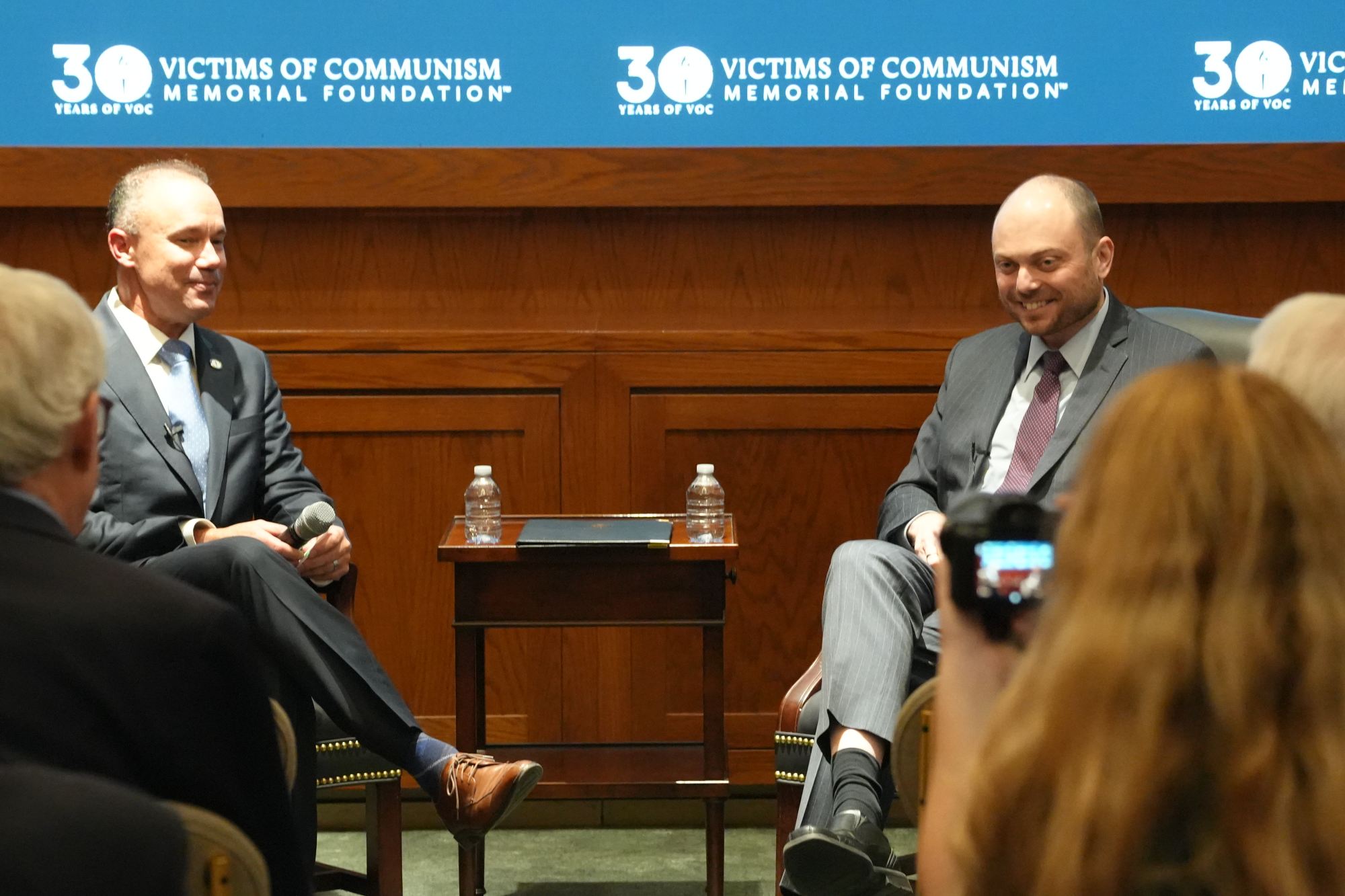
I first met Kara-Murza at Skidmore College back in 2018, when I brought him to campus for two nights to speak about the future of Russia. One night he showed his documentary film Nemtsov (about the opposition leader and Kara-Murza’s friend and mentor), followed by a lengthy Q&A session. The next evening he participated in a public conversation with the historian Jonathan Brent on the future of Russia. I was struck by his unique combination of conviction, intelligence, and lucidity, by the way he spoke eloquently and passionately about Putin’s rise and the prospects of a democratic future for his home country. I was struck, much to my surprise, by his hope.
Born in 1981, Kara-Murza’s memories of the Soviet era are mostly images—red stars and the like. His Moscow school was near Lubyanka Square and the building that housed the KGB. During August 1991, while at recess, he recalls seeing the empty pedestal of the statue of Felix Dzerzhinsky, founder of the Cheka, the KGB’s predecessor. This was during the attempted coup by eight Soviet officials who tried to seize control of the country from General Secretary Mikhail Gorbachev. Boris Yeltsin, an ally of Gorbachev, condemned the coup and inspired mass demonstrations in Moscow. On the night of August 24, the state of Dzenrzinsky was torn down—a vital symbolic move as the KGB was the primary instrument of repression and terror throughout the history of the Soviet Union. Kara-Murza’s formative years took place amid this period of unrest and possibility.
Later he would visit the Soviet archives to see the state security records of his great-grandfather, who was interrogated twice before his execution during the Stalin era. Kara-Murza noticed the shaky handwriting of his signature, likely caused by the exhaustion and trauma from torture. His grandfather’s file revealed his eight-year sentence to the Soviet labor camps under Article 58, Section 10—the provision of the criminal code dealing with counter-revolutionary or anti-Soviet activity. Like similar provisions in the criminal codes of the Warsaw Pact nations, 58.10 is purposely vague in outlining what “counter-revolutionary” activity might be. It’s no surprise that Solzhenitsyn once said, “In all truth, there is no step, thought, or action, or lack of action under the heavens which could not be punished by the heavy hand of Article 58.” Kara-Murza’s 2022 indictment for statements hostile to the Russian government seemed eerily similar to the troubles of his forebearers.
His overall composure since his release from prison this past August is striking given all he has been through the past decade. In recent interviews, Kara-Murza seems fond of drawing upon Solzhenitsyn’s short text from 1974, “Live Not By Lies.” He reminded his audience at the Victims of Communism Memorial Foundation of this line in particular: “For violence has nothing to cover itself with but lies, and lies can only persist through violence.”
Vladimir Putin’s government has proven itself over and over again to be a “regime of murderers,” in Kara-Murza’s phrase. The execution of Kara-Murza’s fellow dissident Alexei Navalny on February 16 is the most recent evidence that he mentioned on this score, but it’s certainly not the only one. The killing of Kara-Murza’s longtime friend and mentor Boris Nemtsov on February 27, 2015, clearly marked him forever. Other notable, but less recent, examples include Sergei Yushenkov in 2003, Anna Politkovskaya in 2006, and Natalya Estemirova in 2009.
He became more animated when asked about the posture and actions of Western governments and other actors vis-à-vis the Putin regime. “A large share of what Putin has become rests on Western appeasement,” he remarked. He recalls one Western leader who claimed to have “looked into Putin’s soul,” another who invited a so-called “reset,” and a German chancellor who simply sold himself to Putin—though he was purposefully vague about their identities. (Given the timing, we can guess he was referring to Presidents Bush and Obama, and to Chancellor Gerhard Schröder.) He’s also frustrated with companies like Apple, which removed about 60 VPN apps in Russia between July and September of this year, making it difficult for Russians to access what the state deems “unlawful content.”
Kara-Murza credits Putin’s rise in large part to Russia’s failure to confront its communist past. As he noted in Oslo in 2021, “Russia is not a place where human rights reign. … There are more political prisoners in Russia today than at the end of the Soviet Union … a stark reminder of the grave mistake Russia’s short-lived democratic government made in the 1990s by its inability—or its unwillingness—to fully come to terms with the Soviet past.” Russia has not done enough to repudiate communism and to take concrete steps to prevent those at the upper echelons of the party from participating in the government today.
And far from repudiation, figures like Putin have done much to attempt to ensure that communism maintains a certain respect. Kara-Murza recalls that one of Putin’s first acts as prime minister in 1999 was to restore a memorial plaque to longtime KGB official Yuri Andropov—who was also general secretary of the Communist Party from November 1982 until his death 15 months later—in a building where he once lived. In 2004, a 10-foot statue of Andropov was erected in Patrozavodsk, north of St. Petersburg to mark his 90th birthday. Russia has never passed any significant lustration legislation—laws designed to prevent top officials from the communist era from serving in positions of political authority. Kara-Murza recalls speaking with former Soviet dissident Vladimir Bukovsky about his frustrations on this score. When advocating for the necessity of lustration, Bukovksy was often told that such legislation would lead to “witch hunts.” Without it, Bukovsky replied, “The witches will come back and hunt for you!” It’s fair to say that Bukovsky proved prescient on this score.
“Why would you go back to Russia?” Eric Patterson, president of the Victims of Communism Memorial Foundation, asked Kara-Murza this simple but important question at the November event. He received a simple answer. “I’m a Russian politician. This is my life. I’ve been doing this since 1999. And further, I can’t very well call on Russian citizens to stand up if I don’t do it myself.”
Kara-Murza’s study of Soviet dissidents over 20 years ago led to the making of a documentary called They Chose Freedom. One lesson he learned from them is that fear is a choice. “Each individual can choose if he is afraid,” Kara-Murza said. This answer is not so simple and points to the mystery of the conjunction of moral and intellectual virtue. For courage to be courage, it has to be chosen. One has to act with one’s mind fully alive to the circumstances and dangers. But what, ultimately, will move one to act? It’s probably not something that one can explain in precisely rational terms. It’s a sense of duty, a desire for nobility or dignity that one sees as befitting this particular choice. Kara-Murza recalls that Bukovsky was asked the same question (why would you go back to Russia?) and Bukovsky replied that it was because “people [were] becoming afraid again.”
Both men understood that one cannot simply argue that people ought to have a certain dignity. Rather, one needs to display it, to embody it.
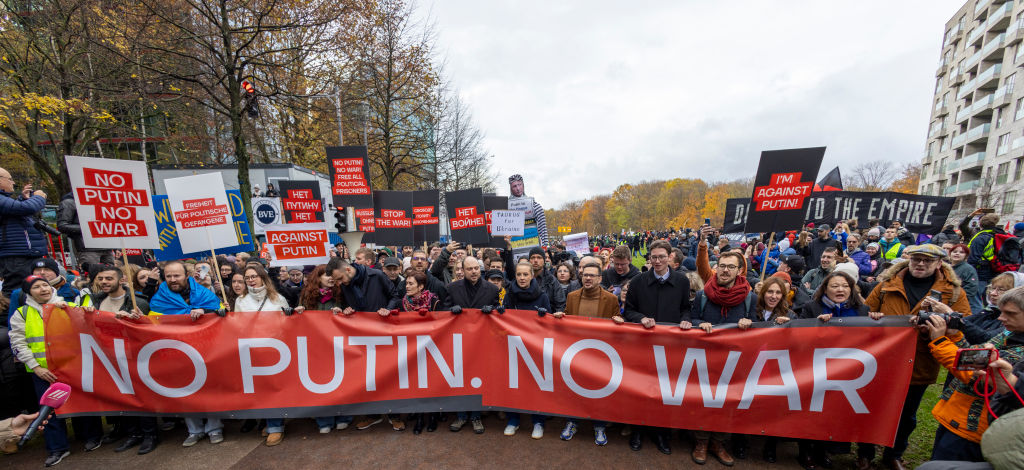
Reflecting on what enabled him to endure his imprisonment, Kara-Murza mentioned his Christian faith, his knowledge of history, and his conviction that he was in the right. He did not speak at length about his faith, but one can see how his study of the Russian past has contributed to his self-understanding and confidence that the path he has taken is one trodden by predecessors. He knows that he speaks the truth—and that the truth matters.
Kara-Murza remains hopeful about Russia’s future. Last winter, during the “so-called” presidential election, state propaganda made it seem that support for the current government was widespread. Yet Kara-Murza received news of long lines to get nominating petitions so Boris Nadezhdin could get on the ballot—someone who has openly called the war in Ukraine a mistake. He received one letter from a woman in a town near the Black Sea who had waited to get such a petition. “I never realized how many of us there are,” she wrote.
And so more will find their courage thanks to the likes of Vladimir Kara-Murza. As Solzhenitsyn reminded his fellow Russians in “Live Not By Lies”:
And it is not every day and not on every shoulder that violence brings down its heavy hand: It demands of us only a submission to lies, a daily participation in deceit—and this suffices as our fealty.”
There are lessons for those of us fortunate enough to live in relative freedom. Kara-Murza reminds us that the possibility and choice of sacrifice attests to the reality of conscience—the genuine experience of responsibility. The late political scientist Peter Lawler was very early and prescient in recognizing that dissidents like Václav Havel and Solzhenitsyn, somewhat paradoxically given the collapse of communism in Russia and Central Europe, had important lessons for Western audiences. As Lawler noted over 30 years ago:
Our language is weak in making moral distinctions, and we do not experience strongly or clearly the horizon of highest sacrifice as genuine or good. Because we are not particularly courageous, we are personally irresponsible and find it difficult to cultivate voluntary self-restraint. We prefer impersonal theories such as Marxism and other forms of social and economic determinism to the truth about human existence. Because we do not experience ourselves as strongly bound to something higher, we find it difficult to resist materialistic determination in both theory and practice.
I’m not sure we in the West have improved much since Lawler wrote those lines. He’s right that we need to speak more clearly about virtues like courage and moderation. The cultivation of self-restraint and courage is possible only with a belief that personal conduct can be more powerful than systems or structures. As the writer Yuval Levin has recently pointed out, people’s lack of trust in institutions is tied directly to their judgment that the people who inhabit those institutions are unrestrained. Our capacity to discipline the desire for personal advantage at the expense of the common good or to overcome fear of disapproval for telling hard truths—these are examples of conscience at work.
Most of us probably won’t be called to attest to the truth in the stark and dire fashion of Vladimir Kara-Murza. But it’s good to be reminded how human it is that the experience of conscience ties us to the world—that a choice for suffering can be both good and true.
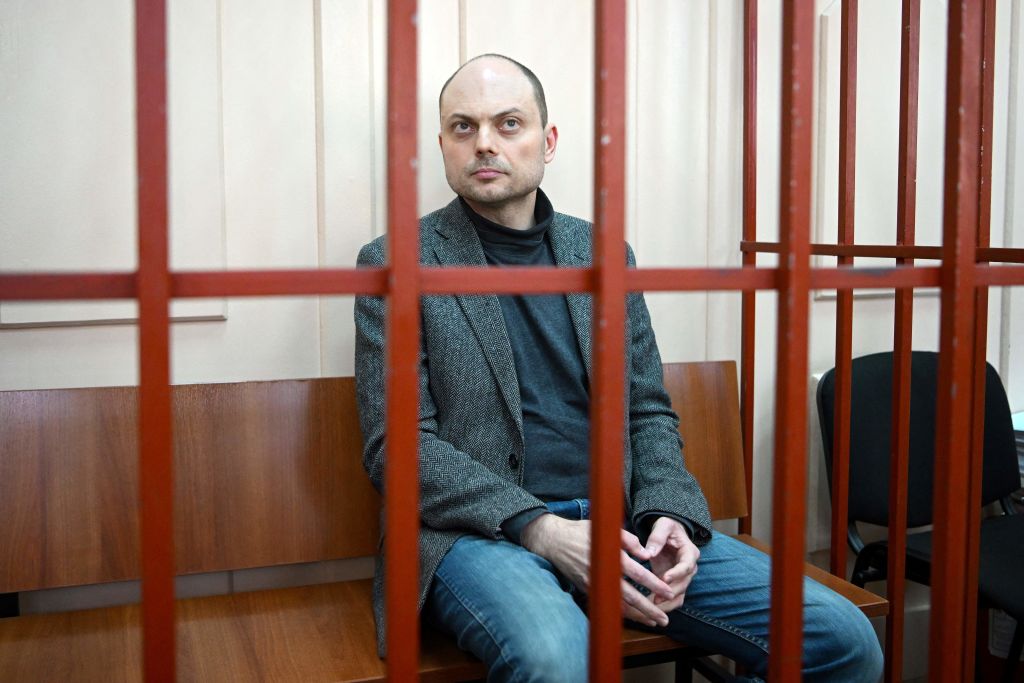
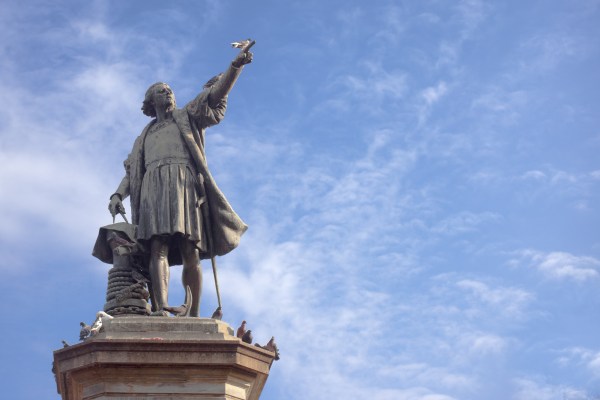
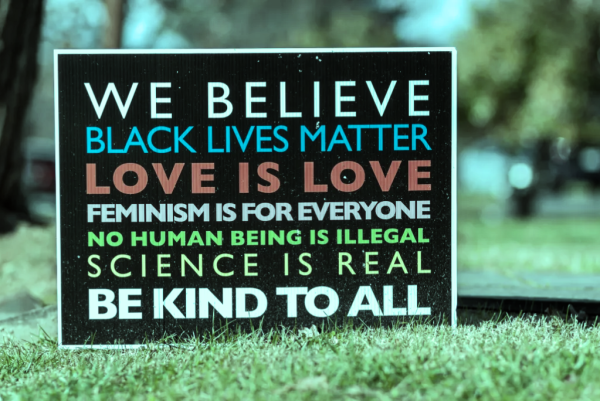
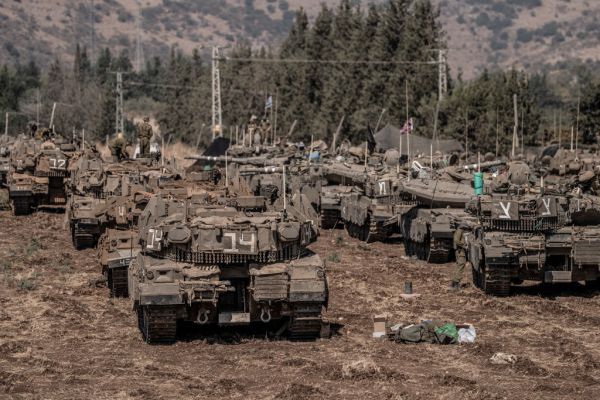

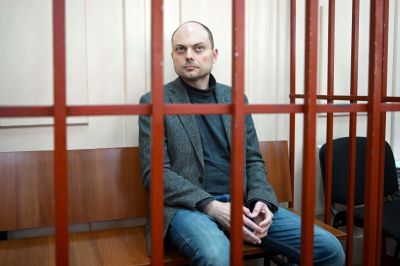
Please note that we at The Dispatch hold ourselves, our work, and our commenters to a higher standard than other places on the internet. We welcome comments that foster genuine debate or discussion—including comments critical of us or our work—but responses that include ad hominem attacks on fellow Dispatch members or are intended to stoke fear and anger may be moderated.
With your membership, you only have the ability to comment on The Morning Dispatch articles. Consider upgrading to join the conversation everywhere.